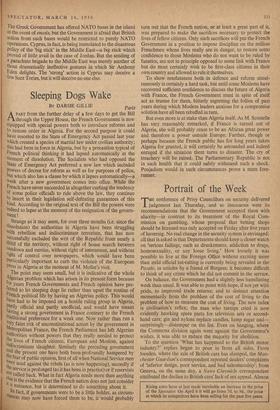Sleeping Dogs Wake
By DARSIE GIME Paris A PART from the further delay of a few days to get the Bill IA through the Upper House, the French Government is now equipped with special powers both to introduce reforms and to restore order in Algeria. For the second purpose it could have resorted to the State of Emergency Act passed last year Which created a species of martial law under civilian authority; this had been in force in Algeria, but by a precaution typical of french political thinking it had lapsed automatically at the moment of dissolution. The Socialists who had opposed the State of Emergency Act preferred a new law which included Powers of decree for reform as well as for purposes of police, but Which also has a clause by which it lapses automatically—a Week after a new government comes into office. While the Vrench have never succeeded in altogether curbing the tendency of some police officials to ride above the law, they continue to insert in their legislation self-defeating guarantees of this kind. According to the original text of the Bill the powers were indeed to lapse at the moment of the resignation of the govern- ment !
Strange as it may seem, for over three months (i.e. since the dissolution) the authorities in Algeria have been struggling with rebellion and indiscriminate terrorism, that has now saccessfully excluded the writ of the Republic from nearly a third of the territory, without right of house search between sundown and sunrise, without right of internment, and without right of control over newspapers, which would have been Particularly important to curb the violence of the European Press in Algeria at the moment of M. Mollet's visit.
The point may seem small, but it is indicative of the whole Algerian problem which has arisen in its present form because 1"r years French Governments and French opinion have pre- ferred to let sleeping dogs lie rather than upset the routine of French political life by having an Algerian policy. This would Itoe had to be imposed on a hostile ruling group in Algeria, Partly official and partly unofficial, and would have meant Itaving a strong government in France contrary to the French traditional preference for a weak one. Now rather than run a Metropolitan faint risk of unconstitutional action by the government in metropolitan France, the French Parliament has left Algerian 'iuthorities without powers that they really needed to protect the lives of French citizens, European and Moslem, against Indiscriminate slaughter. Similarly the preceding government old the present one have both been- profoundly hampered by he fear of public opinion, first of all when National Service men were used against the rebels (as is now happening), secondly if the service is prolonged (as it has been in practice) or if reservists called back. What in fact Algeria needs more than anything vise is the evidence that the French nation does not just consider 'I a nuisance, but is determined to do something about it. In fact, if governments were to be a little bolder, as circum- Lances may now have forced them to be, it would probably turn out that the French nation, or at least a great part of it, was prepared to make the sacrifices necessary to protect the lives of fellow citizens. Only such sacrifices will put the French Government in a position to impose discipline on the million Frenchmen whose lives really are in danger, to restore some confidence to those Moslems who do not want to be ruled by fanatics, are not in principle opposed to some link with France but do most certainly wish to be first-class citizens in their own country and allowed to rule it themselves.
To show resoluteness both in defence and reform simul- taneously is certainly a hard task, but until some Moslems have recovered sufficient confidence to discuss the future of Algeria with France, the French Government must in spite of itself act as trustee for them, bitterly regretting the follies of past years during which Moslem leaders anxious for a compromise solution have all been rebuffed in turn.
But even more is at stake than Algeria itself. As M. Soustelle has very reasonably remarked, if France is turned out of Algeria, she will probably cease to be an African great power and therefore a power outside Europe. Further, though or perhaps because the French public has for long years taken Algeria for granted, it will certainly be astounded and indeed enraged if the situation there turns to disaster. The cry of treachery will be raised. The Parliamentary Republic is not in such health that it could safely withstand such a shock. Poujadism would in such circumstances prove a mere fore- runner.


































 Previous page
Previous page